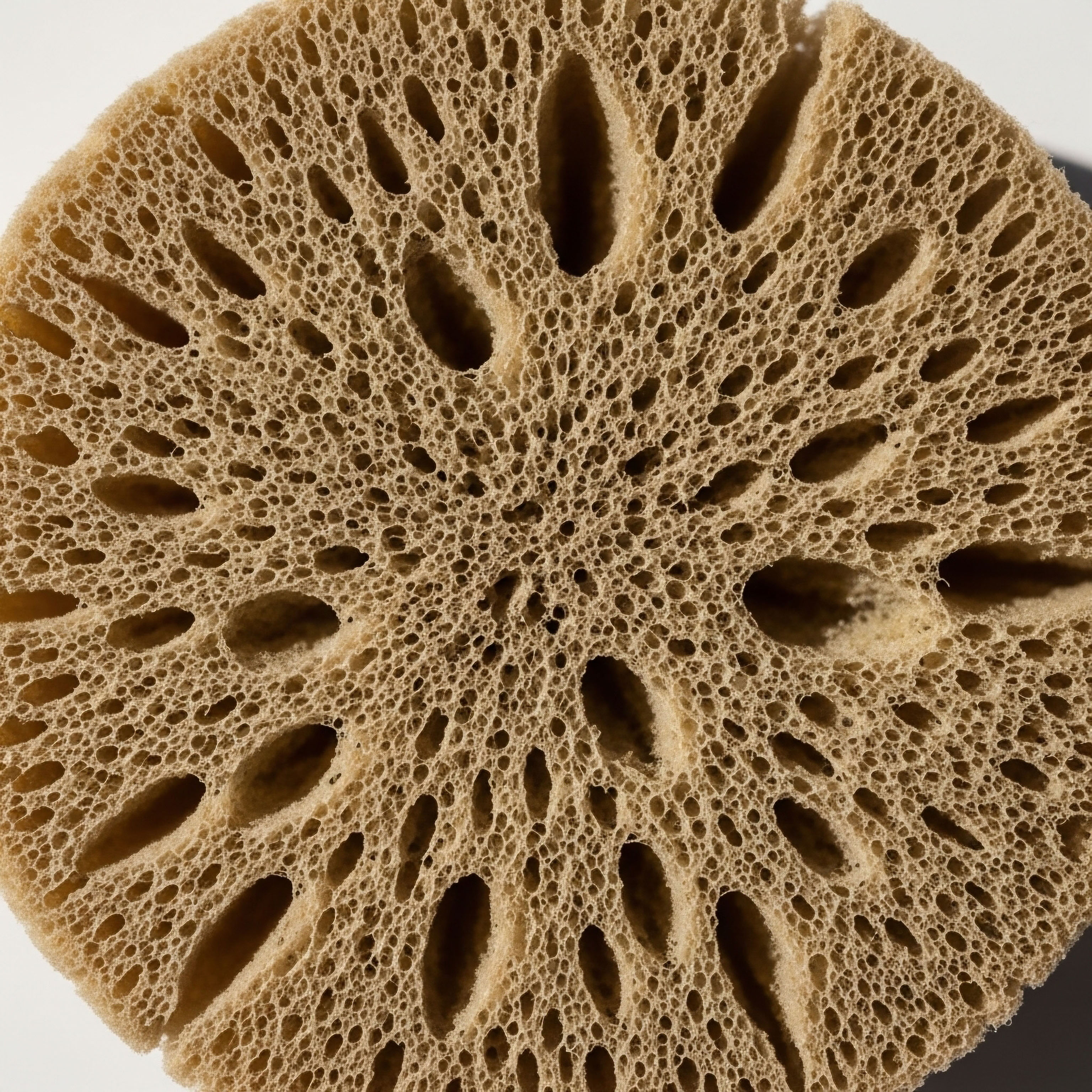

Fundamentals
Have you ever felt that subtle shift in your well-being, a quiet whisper from within that something isn’t quite aligned? Perhaps it manifests as an unexpected change in mood, a persistent fatigue that defies explanation, or a recalcitrant weight gain despite your best efforts.
These experiences, often dismissed as simply “getting older” or “stress,” are frequently signals from your body’s intricate internal communication network, particularly its hormonal systems. Understanding these signals, and the biological mechanisms behind them, is the first step toward reclaiming your vitality and function without compromise.
Your body operates as a symphony of interconnected systems, each influencing the others in a delicate dance of biochemical processes. Among the most influential, yet often overlooked, conductors of this symphony is your gut microbiome. This vast community of microorganisms residing within your digestive tract plays a far more expansive role than mere digestion.
It actively participates in regulating various physiological functions, including those of your endocrine system. The long-term implications of supporting this microbial ecosystem, particularly through the use of beneficial bacteria known as probiotics, extend deeply into the realm of hormonal health, offering a pathway to systemic balance.

The Gut’s Hormonal Connection
The digestive system and the endocrine system maintain a continuous dialogue. This communication is not a simple one-way street; rather, it is a bidirectional exchange where gut microbes influence hormone activity, and hormones, in turn, can shape the microbial landscape. This dynamic interplay means that the health of your gut directly impacts the equilibrium of your hormones, affecting everything from metabolic regulation to reproductive function. When this delicate balance is disrupted, symptoms can arise that feel disorienting and frustrating.
Consider the concept of the estrobolome, a specific collection of gut bacteria and their genetic material responsible for metabolizing estrogens. These microorganisms produce enzymes, notably beta-glucuronidase, which play a pivotal role in regulating the circulation of estrogens within the body.
Estrogens, primarily synthesized in the ovaries, adrenal glands, and adipose tissue, undergo a process of conjugation in the liver, making them water-soluble for excretion. Once in the intestine, the estrobolome can either facilitate their elimination or deconjugate them, allowing active estrogens to be reabsorbed into the bloodstream. This reabsorption directly influences the overall estrogen load in the body.
The gut microbiome, particularly the estrobolome, acts as a crucial regulator of circulating estrogen levels, impacting overall hormonal balance.

Probiotics as Biological Modulators
Probiotics are live microorganisms, often specific strains of bacteria such as Lactobacillus and Bifidobacterium, which, when administered in adequate amounts, confer a health benefit upon the host. Their utility extends beyond digestive support, reaching into the complex regulatory networks of the body.
By introducing or supporting beneficial microbial populations, probiotics can influence the gut environment, thereby indirectly affecting hormonal pathways. This influence can manifest through several mechanisms, including the production of beneficial metabolites, modulation of immune responses, and direct interaction with the endocrine system’s signaling molecules.
The long-term use of probiotics, therefore, represents a strategy for sustained support of the gut microbiome, which can, in turn, contribute to a more stable hormonal environment. This is not about a quick fix; it is about cultivating an internal ecosystem that supports your body’s innate capacity for balance and resilience over time. Understanding this foundational connection allows for a more informed and proactive approach to personal wellness, moving beyond symptom management to address underlying biological drivers.


Intermediate
Moving beyond the foundational understanding of the gut-hormone connection, we can now explore the specific clinical implications of probiotic use for hormonal health. The influence of the gut microbiome on endocrine function is multifaceted, extending to various hormones beyond estrogen, including androgens, insulin, and even stress hormones. Probiotic interventions, when thoughtfully applied, can serve as a supportive measure within broader personalized wellness protocols, working synergistically with other targeted therapies.

How Probiotics Influence Hormonal Systems
The mechanisms through which probiotics exert their effects on hormonal balance are diverse and interconnected. One primary pathway involves the production of short-chain fatty acids (SCFAs) like butyrate, propionate, and acetate. These metabolites, generated by bacterial fermentation of dietary fibers, serve as signaling molecules that can influence metabolic health, inflammation, and even direct hormone production.
For instance, SCFAs can improve insulin sensitivity, a key factor in conditions like polycystic ovary syndrome (PCOS), where insulin resistance often contributes to hormonal dysregulation.
Another significant mechanism is the modulation of gut barrier function. A healthy intestinal barrier prevents the translocation of bacterial toxins and undigested food particles into the bloodstream, a phenomenon known as “leaky gut.” When the barrier is compromised, it can trigger systemic inflammation, which in turn can disrupt hormonal signaling and contribute to conditions such as thyroid dysfunction or adrenal fatigue. Probiotics can strengthen the intestinal lining, reducing inflammation and supporting overall endocrine resilience.
Probiotics also interact with the gut-brain axis, a bidirectional communication network linking the central nervous system with the enteric nervous system of the gut. This axis involves neural, endocrine, and immune pathways. Gut microbes can produce or influence the production of neurotransmitters like serotonin and gamma-aminobutyric acid (GABA), which affect mood and stress responses.
Chronic stress, mediated by hormones like cortisol, can profoundly impact gut health and, consequently, hormonal balance. By helping to regulate stress responses and neurotransmitter production, certain probiotic strains can indirectly support hormonal equilibrium.
Probiotics influence hormonal balance by producing beneficial metabolites, enhancing gut barrier integrity, and modulating the gut-brain axis.

Probiotic Applications in Hormonal Balance
While direct, large-scale human trials specifically on long-term probiotic use for hormonal health are still expanding, existing research provides compelling insights into their potential supportive roles.

Female Hormonal Balance
For women, the estrobolome’s activity is particularly relevant. An imbalance in the estrobolome, often characterized by reduced microbial diversity or an overabundance of beta-glucuronidase-producing bacteria, can lead to excessive reabsorption of estrogen. This can contribute to conditions associated with estrogen dominance, such as endometriosis, premenstrual syndrome (PMS), and certain estrogen-sensitive cancers. Probiotic strains, particularly those from the Lactobacillus and Bifidobacterium genera, have shown promise in modulating the estrobolome, potentially aiding in the healthy elimination of estrogens.
In the context of Polycystic Ovary Syndrome (PCOS), a common endocrine disorder characterized by insulin resistance and androgen excess, probiotic supplementation has demonstrated encouraging results. Studies indicate that specific probiotic and synbiotic (probiotic + prebiotic) interventions can improve markers of insulin resistance, lipid profiles, and even reduce total testosterone levels in women with PCOS. This suggests a supportive role for gut modulation in managing the complex hormonal dysregulation seen in this condition.

Male Hormonal Optimization
For men, the connection between gut health and testosterone levels is also gaining recognition. Chronic inflammation originating in the gut can interfere with testosterone production and elevate cortisol, further suppressing androgen synthesis. A healthy gut microbiota supports testosterone levels by maintaining a balanced intestinal environment. Research in animal models has even suggested that certain probiotic microbes can sustain youthful serum testosterone levels and testicular size, although human data is still evolving.
The gut microbiome influences how much testosterone circulates in the bloodstream, partly by affecting sex hormone-binding globulin (SHBG), a protein that binds to testosterone, making it inactive. Some studies propose that gut bacteria can influence SHBG production, thereby impacting the availability of free, active testosterone. Dietary choices, including fermented foods and fiber-rich options, along with probiotic supplementation, can support microbial diversity, creating an environment conducive to balanced testosterone levels.

Integrating Probiotics into Wellness Protocols
When considering personalized wellness protocols, such as Testosterone Replacement Therapy (TRT) for men or women, or Growth Hormone Peptide Therapy, optimizing gut health with probiotics can be a valuable adjunctive strategy. A well-functioning gut supports nutrient absorption, reduces systemic inflammation, and helps maintain metabolic efficiency, all of which are foundational for the optimal response to exogenous hormone or peptide administration.
For instance, reducing inflammation through gut support might enhance the body’s receptivity to hormonal signals, potentially improving the efficacy of prescribed protocols.
Here is a general overview of how probiotics can support various aspects of hormonal health ∞
- Estrogen Metabolism ∞ Probiotics, particularly Lactobacillus species, can influence the estrobolome’s activity, promoting healthy estrogen elimination and potentially mitigating conditions related to estrogen dominance.
- Androgen Balance ∞ By reducing inflammation and supporting metabolic health, probiotics may indirectly contribute to more balanced testosterone levels, especially in contexts of insulin resistance or chronic inflammation.
- Insulin Sensitivity ∞ Certain probiotic strains improve insulin signaling, which is critical for managing conditions like PCOS and metabolic syndrome, thereby supporting overall metabolic and hormonal health.
- Stress Hormone Regulation ∞ Through the gut-brain axis, probiotics can influence neurotransmitter production and reduce cortisol levels, fostering a more resilient hormonal response to stress.
- Thyroid Function ∞ While direct links are still being explored, a healthy gut reduces systemic inflammation, which is beneficial for autoimmune thyroid conditions like Hashimoto’s thyroiditis.
The long-term consideration for probiotic use is not merely about taking a supplement; it is about cultivating a resilient internal environment that supports the body’s complex hormonal orchestra. This sustained support can lead to more stable hormone levels, improved metabolic markers, and a greater sense of overall well-being, complementing targeted clinical interventions.
| Probiotic Strain | Primary Hormonal Association | Mechanism of Action |
|---|---|---|
| Lactobacillus acidophilus | Estrogen metabolism, vaginal health | Modulates beta-glucuronidase activity, supports healthy vaginal microbiome. |
| Bifidobacterium lactis | Metabolic health, insulin sensitivity | Produces SCFAs, improves gut barrier, influences glucose metabolism. |
| Lactobacillus reuteri | Testosterone levels (animal studies) | Anti-inflammatory effects, potential influence on Leydig cell function. |
| Lactobacillus rhamnosus GG | Stress hormones, gut-brain axis | Influences neurotransmitter production, reduces cortisol. |
| Saccharomyces boulardii | Gut barrier integrity, inflammation | Supports tight junctions, reduces inflammatory cytokines, indirectly aids hormonal stability. |


Academic
To truly appreciate the long-term implications of probiotic use for hormonal health, we must delve into the sophisticated interplay of biological axes and molecular pathways. The gut microbiome’s influence extends beyond simple digestive processes, acting as a critical modulator of endocrine signaling, metabolic homeostasis, and even neuroendocrine function. This systems-biology perspective reveals how sustained microbial support can contribute to a robust physiological foundation, optimizing the body’s inherent regulatory capacities.

The Gut-Endocrine Axis ∞ A Deeper Examination
The communication between the gut and the endocrine system is mediated by a complex network involving neural, humoral, and immune pathways. The gut, often referred to as the “second brain,” houses an extensive enteric nervous system (ENS) that can operate independently yet remains in constant dialogue with the central nervous system (CNS) via the vagus nerve. This neuro-hormonal crosstalk allows for rapid and precise adjustments in response to internal and external cues.
Microbial metabolites, particularly SCFAs, serve as key signaling molecules in this axis. Butyrate, for instance, is not only a primary energy source for colonocytes but also possesses anti-inflammatory properties and can influence gene expression through histone deacetylase inhibition.
These systemic effects can impact the sensitivity of peripheral tissues to hormones, such as insulin, and modulate the inflammatory milieu that often underlies hormonal dysregulation. The long-term presence of a diverse, SCFA-producing microbiome, supported by probiotics, therefore contributes to a sustained anti-inflammatory and metabolically favorable environment.

Estrogen Metabolism and the Estrobolome’s Enzymatic Activity
The estrobolome’s role in estrogen recirculation is a prime example of the gut’s direct impact on hormone levels. Estrogens, after being conjugated in the liver with glucuronic acid or sulfate, are excreted into the bile and enter the intestinal lumen. Here, specific bacterial enzymes, predominantly beta-glucuronidase (GUS), deconjugate these estrogens, rendering them active and reabsorbable. An elevated activity of microbial GUS can lead to increased reabsorption of estrogens, potentially contributing to conditions of estrogen excess.
Long-term probiotic intervention, particularly with strains known to modulate GUS activity or to outcompete GUS-producing bacteria, can theoretically lead to a more balanced estrogen excretion profile. This sustained modulation could reduce the recirculating estrogen load, offering a non-pharmacological strategy to support hormonal equilibrium over time. This mechanism is particularly relevant for conditions like endometriosis, uterine fibroids, and certain hormone-sensitive cancers, where estrogen dominance is a contributing factor.
Consider the implications for individuals undergoing female hormone balance protocols, which might involve low-dose testosterone or progesterone. The efficacy of these exogenous hormones can be influenced by the body’s endogenous hormone metabolism and clearance pathways. A well-regulated estrobolome, supported by consistent probiotic use, ensures that the body processes and eliminates hormones efficiently, preventing accumulation of active forms that could lead to unintended side effects or suboptimal therapeutic outcomes.

Androgen Homeostasis and Microbial Influence
While the estrobolome is well-characterized for estrogen, the gut microbiome’s influence on androgens, such as testosterone, is also being elucidated. Chronic low-grade inflammation, often stemming from gut dysbiosis, can activate the hypothalamic-pituitary-adrenal (HPA) axis, leading to sustained cortisol elevation. Cortisol, a glucocorticoid, can directly suppress gonadal hormone production, contributing to functional hypogonadism. By mitigating systemic inflammation and supporting HPA axis regulation, probiotics can indirectly support endogenous testosterone synthesis.
Furthermore, the gut microbiome influences the enterohepatic circulation of androgens and their metabolites. Some gut bacteria possess enzymes that can deconjugate androgen metabolites, similar to their action on estrogens, allowing for reabsorption. The balance of these microbial enzymes can therefore affect the bioavailability of active androgens. While direct human clinical trials showing significant increases in testosterone from probiotic use alone are limited, particularly in hypogonadal men, the supportive role of a healthy gut environment in overall endocrine function remains compelling.
For men engaged in Testosterone Replacement Therapy (TRT), maintaining optimal gut health can be a supportive strategy. A healthy gut ensures efficient nutrient absorption, which is vital for overall metabolic health and the synthesis of precursor molecules for hormone production. Moreover, by reducing inflammation, a balanced microbiome can potentially mitigate some of the inflammatory responses that might arise from metabolic shifts associated with TRT, contributing to a more stable and effective therapeutic experience.

Metabolic Pathways and Hormonal Crosstalk
The gut microbiome’s impact on metabolic health is inextricably linked to hormonal regulation. Dysbiosis can contribute to insulin resistance, a state where cells become less responsive to insulin, leading to elevated blood glucose and compensatory hyperinsulinemia. This, in turn, can disrupt ovarian function in women (e.g. PCOS) and impair testicular function in men. Probiotic strains, particularly Bifidobacterium and Lactobacillus species, have been shown to improve insulin sensitivity, reduce fasting glucose, and modulate lipid profiles.
This metabolic improvement, sustained over time with consistent probiotic use, creates a more favorable hormonal milieu. When the body’s cells are more sensitive to insulin, the burden on the pancreas is reduced, and the downstream hormonal cascades influenced by insulin signaling (e.g. androgen production in ovaries, sex hormone-binding globulin synthesis in the liver) can normalize. This long-term metabolic recalibration, facilitated by a healthy gut, is a cornerstone of systemic hormonal balance.
Here is a summary of key enzymatic and metabolic pathways influenced by the gut microbiome, with implications for hormonal health ∞
- Beta-Glucuronidase Activity ∞ Gut bacteria produce this enzyme, which deconjugates estrogens, allowing their reabsorption and influencing circulating levels. Modulating this activity through probiotics can impact estrogen load.
- Short-Chain Fatty Acid Production ∞ Fermentation of dietary fiber by beneficial bacteria yields SCFAs (butyrate, propionate, acetate), which improve insulin sensitivity, reduce inflammation, and influence gut-brain axis signaling.
- Bile Acid Metabolism ∞ The gut microbiome modifies bile acids, which are signaling molecules that interact with nuclear receptors (e.g. FXR, TGR5) involved in glucose, lipid, and energy metabolism, indirectly affecting hormonal regulation.
- Neurotransmitter Synthesis ∞ Gut microbes produce or influence precursors for neurotransmitters like serotonin and GABA, impacting mood, stress responses, and the HPA axis, thereby influencing stress hormones like cortisol.
- Inflammatory Cytokine Modulation ∞ A balanced microbiome reduces systemic inflammation by strengthening the gut barrier and producing anti-inflammatory compounds, which is crucial for preventing inflammation-induced hormonal disruption.
| Enzyme | Produced By | Hormonal Impact | Clinical Relevance |
|---|---|---|---|
| Beta-Glucuronidase | Various gut bacteria (e.g. E. coli, Bacteroides) | Deconjugates estrogens, increasing reabsorption and circulating levels. | Estrogen dominance, PCOS, endometriosis, hormone-sensitive cancers. |
| Beta-Glucosidase | Certain gut bacteria | Deconjugates phytoestrogens (e.g. daidzein to equol), influencing estrogenic activity. | Phytoestrogen bioavailability, menopausal symptom management. |
| Steroid 17-alpha-hydroxylase | Specific gut bacteria | Potentially influences androgen metabolism. | Androgen balance, though less studied than estrobolome. |
| Cholesterol Reductase | Certain gut bacteria | Converts cholesterol to coprostanol, affecting cholesterol absorption (precursor to steroid hormones). | Steroidogenesis, overall metabolic health. |

What Are the Long-Term Effects of Probiotic Supplementation on Endocrine Resilience?
The concept of endocrine resilience refers to the body’s capacity to maintain hormonal balance and adapt to stressors over time. Long-term probiotic supplementation, by consistently supporting a diverse and functional gut microbiome, contributes to this resilience. It helps to regulate inflammatory pathways, optimize metabolic processes, and fine-tune the communication between the gut and the brain.
This sustained internal harmony means the body is better equipped to handle physiological demands, whether they stem from aging, environmental exposures, or lifestyle choices.
This is particularly relevant for individuals navigating the complexities of age-related hormonal changes, such as andropause in men or peri- and post-menopause in women. As endogenous hormone production naturally declines, the body’s ability to efficiently metabolize and utilize remaining hormones, or to respond optimally to exogenous therapies, becomes paramount.
A healthy gut, fostered by long-term probiotic use, provides a supportive internal environment that can enhance the effectiveness of interventions like Testosterone Cypionate or Progesterone, ensuring that the body is primed for biochemical recalibration.

How Do Gut Microbial Shifts Impact the Efficacy of Targeted Hormone Therapies?
The effectiveness of targeted hormone therapies, such as Testosterone Replacement Therapy (TRT) or Growth Hormone Peptide Therapy, is not solely dependent on the administered dose. The body’s internal environment, significantly shaped by the gut microbiome, plays a substantial role.
For instance, if systemic inflammation is high due to gut dysbiosis, it can create a state of cellular resistance to hormonal signals, potentially diminishing the therapeutic impact of exogenous hormones. Inflammatory cytokines can interfere with receptor sensitivity, meaning that even adequate hormone levels might not translate into optimal cellular function.
Moreover, the metabolism and clearance of therapeutic agents can be influenced by gut health. The liver processes many compounds, including hormones and medications like Anastrozole, before they are excreted. If the gut-liver axis is compromised by dysbiosis, it can affect the efficiency of these detoxification and elimination pathways, potentially leading to altered drug pharmacokinetics or increased burden on the body.
Therefore, a healthy gut, supported by long-term probiotic use, can contribute to a more predictable and beneficial response to prescribed hormonal optimization protocols, ensuring that the body can effectively utilize and process these powerful biochemical recalibrations.

References
- Baker, J. M. Al-Nakkash, L. & Herbst-Kralovetz, M. M. (2017). Estrogen-gut microbiome axis ∞ Physiological and clinical implications. Maturitas, 103, 45-53.
- Male Excel Blog. (2025, April 14). The Link Between Gut Bacteria and Testosterone Production. Retrieved from Male Excel Blog.
- Ruscio, M. (2025, January 8). 8 Health Benefits of Probiotics for Women’s Health. Retrieved from Dr. Michael Ruscio, DC.
- Cleveland Clinic. What Is the Gut-Brain Connection? Retrieved from Cleveland Clinic.
- Hol+. The Best Probiotics for Weight Loss, Hormone Balance, Mood & Women’s Health. Retrieved from Hol+.
- Mayer, E. A. Tillisch, K. & Bradesi, F. (2015). The gut-brain axis ∞ The missing link in functional GI disorders. Journal of Clinical Investigation, 125(3), 926-938.
- Neuman, H. Debelius, J. W. Knight, R. & Koren, O. (2015). The Human Microbiome and Its Potential Role in the Metabolism of Xenobiotics. mBio, 6(1), e01901-14.
- O’Mahony, S. M. Clarke, G. Borre, Y. E. Dinan, T. G. & Cryan, J. F. (2017). Serotonin, tryptophan metabolism and the brain-gut-microbiome axis. Behavioural Brain Research, 322, 32-48.
- Peters, B. A. Lin, J. Qi, Q. et al. (2022). Menopause Is Associated with an Altered Gut Microbiome and Estrobolome, with Implications for Adverse Cardiometabolic Risk in the Hispanic Community Health Study/Study of Latinos. mSystems, 7(3), e00273-22.
- Tomasello, G. Mazzola, M. Leone, A. et al. (2017). Nutrition, oxidative stress and intestinal dysbiosis ∞ Influence of diet on gut microbiota in inflammatory bowel diseases. Biomedical Papers of the Medical Faculty of the University Palacky Olomouc, Czech Republic, 121(2), 107-115.

Reflection
As you consider the intricate dance between your gut microbiome and your hormonal health, recognize that this knowledge is not merely academic; it is a map to your own biological systems. Your body possesses an inherent intelligence, a capacity for balance that can be supported and recalibrated. The journey toward optimal vitality is deeply personal, and understanding these internal connections empowers you to become an active participant in your own well-being.
This exploration of probiotics and their long-term implications for hormonal health serves as a reminder that true wellness stems from a holistic perspective. It invites you to consider how seemingly disparate symptoms might be connected by underlying biological threads, and how seemingly simple interventions can yield profound, sustained benefits. Your path to reclaiming vitality is unique, and armed with this understanding, you are better positioned to seek personalized guidance that honors your individual biological blueprint.



